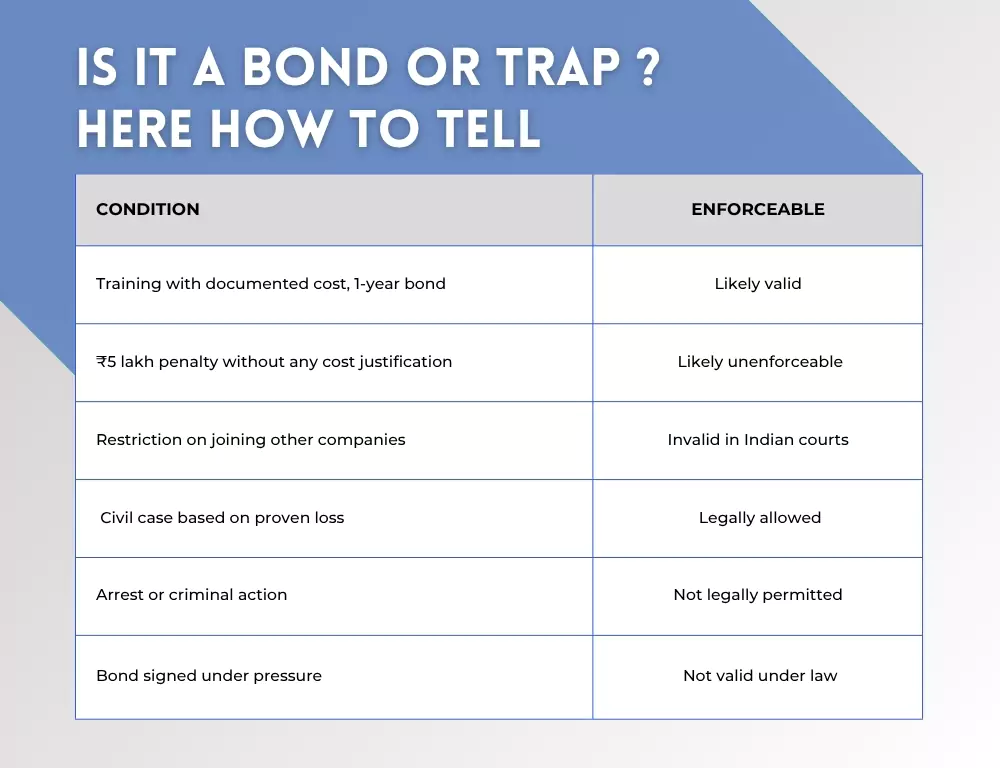The Bond Dilemma That No One Prepares You For
You’ve cracked the interview. The offer letter has arrived. Salary? Satisfying. Role? Promising. But then comes the twist—tucked deep within the fine print of that letter:
"If you leave within 2 years, you will be required to pay ₹5,00,000 to the company."
It's not unusual. It's not rare. It's alarmingly common—especially in sectors like IT, aviation, pharmaceuticals, and consulting. But here’s what most employees don’t know: Just because it's written, it doesn’t mean it’s legal. And not every bond holds up in a court of law.
This blog cuts through the clutter to bring you the truth about employment bonds in India—how they work, what the law says, and what to do if you’ve signed one or are being pressured to.
What Is an Employment Bond?
An employment bond is a legal agreement between an employer and an employee where the employee agrees to remain with the company for a fixed period—often one or two years—and promises to compensate the employer with a specified amount if they exit earlier than agreed.
The justification? Employers claim they invest time, resources, and training costs into new hires—and the bond is a way to secure that investment. In theory, it makes sense. But in practice, many of these agreements go far beyond fair practice and into the territory of employee exploitation.

Is It Legal for Companies to Make You Sign a Bond?
Yes, it is legal for a company to have you sign a bond. But the real question is not about signing—it's about enforceability.
Under the Indian Contract Act, 1872, a contract (including an employment bond) is valid only if it satisfies certain conditions:
- Free consent
- Lawful consideration and object
- No clauses that go against public policy
- Reasonableness in scope and penalty
So, while a company can ask you to sign a bond, whether that bond is legally binding depends on what’s in it, how it’s structured, and how it was executed.
When Is an Employment Bond Considered Valid and Enforceable?
Not all bonds are problematic. If designed fairly, they can be upheld in court. Here’s when a bond is typically considered valid under Indian law:
1. There Is a Real and Quantifiable Investment by the Employer
This includes:
- Formal training with documented costs
- Relocation expenses
- Specialized onboarding
- Certifications sponsored by the employer
- Licenses, travel, or external consultant fees
If a company can prove that it incurred genuine expenses specifically for you, and that those expenses are tied to the reason for the bond, the clause may be upheld in court.
However, companies must produce actual evidence of this expense. An arbitrary figure like ₹2 or ₹5 lakh without justification is not considered valid.
2. The period of the Bond Is Reasonable
The bond period should be reasonable and justifiable. In India, courts have generally accepted periods of:
- 6 months to 1 year for entry-level roles
- Up to 2 years for mid to senior roles involving substantial investment
Beyond that, any duration that appears excessive or restrictive to your right to career progression is likely to be struck down.
3. The Penalty Amount Is Proportionate to the Investment
The penalty mentioned in the bond must be directly proportional to the actual investment made by the company.
If a company spends ₹50,000 on training and asks for ₹3 lakh in return, the clause is disproportionate and may not be upheld by the court. Indian courts follow the principle of “reasonable compensation” under Section 74 of the Contract Act, not punishment.
The idea is not to penalize the employee, but to recover real, provable losses.
When Does a Bond Become Unenforceable or Illegal?
Now let’s talk about the other side—the flawed, manipulative, or one-sided bonds that have become all too common.
Here are scenarios where the bond is either partially enforceable or entirely void:
1. No Real Cost or Investment by the Company
If the company cannot prove that it spent money on you—be it in the form of training, relocation, or any other investment—then there is no legal basis to demand reimbursement.
Generic onboarding sessions, in-house team briefings, or a simple welcome kit do not constitute valid expenditure.
2. The Penalty Amount Is Arbitrary or Excessive
Demanding ₹5 lakh for a one-week induction training? That's not enforcement—it’s extortion.
Courts look unfavorably at employers trying to use bonds as scare tactics, especially when there is no cost breakdown or rational calculation behind the penalty amount.
3. Restriction on Future Employment (Non-Compete Clauses)
Some bonds include a clause that says:
“The employee shall not join any competitor or work in the same industry for X months after leaving.”
Such clauses are not enforceable in India. Why?
Because they violate Article 19(1)(g) of the Indian Constitution, your fundamental right to practice any profession, or to carry on any occupation, trade, or business.
No employer can deny you the right to earn a living elsewhere—bond or no bond.
4. Consent Was Not Voluntary or Informed
If a bond is signed under duress, pressure, or without full understanding—especially during the hiring process when the employee is in a vulnerable position—then it is not considered voluntary. Consent obtained in such circumstances is invalid under Indian law.

What Happens If You Break the Bond?
This is where fear starts to override logic for many employees.
Let’s break it down factually.
Can You Be Arrested?
No. An employment bond is a civil agreement, not a criminal contract. Breaching it does not result in arrest or police complaints.
Can the Company Sue You?
Yes, but only under certain conditions:
- The company must file a civil suit for damages.
- It must provide documented evidence of actual expenses.
- The burden of proof lies with the employer, not you.
If they can’t prove what they spent and how it’s connected to your early resignation, their case won’t stand.
What Do Most Companies Do?
In reality, most companies:
- Send a legal notice (to create pressure)
- Threaten civil proceedings
- Rarely follow through with court action—because they know they can’t prove losses.
This is often a negotiation strategy, not a genuine legal threat.
How Do Courts View Employment Bonds?
The general judicial attitude in India favors employee rights, as long as the resignation is not in bad faith.
Courts evaluate the following:
- Was the bond executed with free and informed consent?
- Can the employer demonstrate a direct financial loss?
- Is the penalty amount proportionate to the loss?
- Does the bond violate any constitutional or labor rights?
If the bond is found to be one-sided, vague, or oppressive, it is often dismissed as unenforceable.
Landmark cases such as Subex Systems Ltd. v. Siddhartha Kumar Pandey have shown that unless the employer can prove damages, courts are unlikely to grant compensation simply because an employee left early.

What Should You Do If You’re Facing Bond Pressure?
If you’re being asked to sign a bond or being harassed after breaking one, consider the following action plan:
1. Request Documentation
Ask for:
- Proof of training costs
- Details of the expenses incurred
- How the penalty was calculated
If the company avoids this or fails to justify the numbers, that’s a red flag.
2. Consult a Labour Lawyer
Many employees make the mistake of either panicking or ignoring the bond altogether. A short session with a labour lawyer can help you:
- Assess the bond’s legality
- Prepare a response to legal notices.
- Avoid further complications
3. Reach Out to the Labour Commissioner
You have the right to approach your State Labour Commissioner in cases of unfair employment practices, harassment, or violation of labour laws.
This is especially important if you're being denied your full and final settlement, relieving letter, or experience certificate based on bond issues.

Understanding the Bigger Picture with HR HUB
The truth is—employment bonds can be lawful, but they are not absolute. They are meant to protect investments, not suppress employees. When designed ethically, they can offer security for both sides. But when used as tools of intimidation, they quickly fall apart under legal scrutiny.
If you’re an employee trying to navigate the legalities of your job contract—or an HR team building compliant employment frameworks—clarity is key.
At HR HUB we help both employees and employers stay on the right side of the law. From legally vetted templates to compliance automation and HR advisory tools, our platform simplifies the complexities of Indian employment law.
Explore more insights like this through our Know Your HR Facts series and empower yourself with the knowledge that protects your rights.
Let’s make HR smarter, not scarier.






